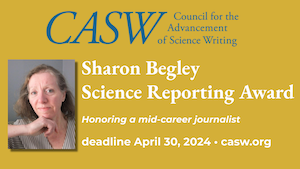When people cling to beliefs that are factually wrong, giving them more information isn't likely to set them straight, for reasons that are hard-wired into our brains. Science communicators need to recognize that, John Timmer writes on ArsTechnica: "People don't think the Earth is young because they haven't been exposed to sufficient evidence for its age; they want to believe that it's young because they feel a cultural affinity for other people who believe that way."
August 13, 2013

.png)

